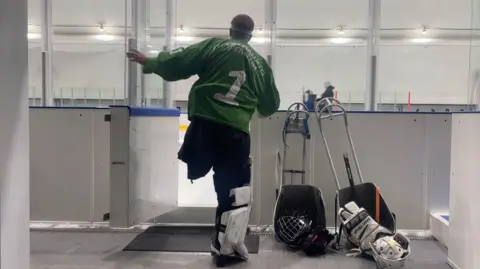At an ice rink in Vladivostok in Russia's far east, 30-year-old Dmitry Afanasyev is in training with teammates from Soyuz, the local Para ice hockey team.
The players have removed their prosthetic legs and are sitting in specially designed sleds. They're using their hockey sticks to propel themselves around the rink.
Dmitry hopes that one day he'll be a Paralympic ice hockey champion.
Making that happen won't be easy. Russian teams were banned from the last Paralympic Games over the war in Ukraine.
And like all his teammates, Dmitry was on the front line.
A mine came flying towards me, recalls Dmitry, who was mobilised to fight in Ukraine. I fell to the ground and could feel my leg burning. I looked down and everything was torn apart. I put on a tourniquet myself and told the guys to drag me out of there.
My wife's a surgeon. So, I sent her a picture of my leg and she replied: 'They'll probably saw it off.' 'OK,' I said. Whether I have one leg, or two legs. Whatever.
The port city of Vladivostok is more than 4,000 miles from Ukraine and from Russia's capital. This is Asia. The border with North Korea is 80 miles from Vladivostok. China is just 35 miles away.
Yet the consequences of a distant war in Europe are more than visible.
At a cemetery on a hill overlooking Vladivostok there are lines of fresh graves: Russian soldiers killed in Ukraine. In addition to Orthodox Christian crosses, military banners and Russian tricolours mark each plot.
In another section of the cemetery stands a memorial to the heroes of the Special Military Operation, the official label the Kremlin continues to employ for Russia's war on Ukraine. Here there are more graves of Russian servicemen and the statue of an armed Russian soldier.
Soldiers live forever, reads the inscription.
After all, Russia is so big and varied. The largest country in the world spans two continents and 11 time zones. Some parts of Russia, such as Kursk and Belgorod, border Ukraine.
This is the furthest I've travelled inside Russia since the start of the war. It's a chance to gauge the mood in a very different part of the country.
Of course we're worried, Svetlana tells me in a Vladivostok park when I ask her about Ukraine. This has been going on for years now and we want it to end as soon as possible. We had hoped the Alaska summit [of Donald Trump and Vladimir Putin] would change something. It hasn't.
People are people. No matter whether they're British or American, Japanese or Ukrainian. I don't know where all the hatred comes from.
In the centre of Vladivostok I stop to listen to a band busking on a pedestrian street. I'm not alone. A large crowd has gathered to enjoy the improvised rock concert.
Between songs I talk to the lead singer, a young local musician who calls himself Johnny London.
Do people talk much about what's happening in Ukraine? I enquire.
People of my age, we don't usually discuss that stuff. Not very often. I would go as far as to say we never talk about that.
Why? I ask.
We can do nothing about that. It's out of our hands, out of our reach. Hopefully in a couple of years it will get back to normal.
And what is normal?
No war, I guess. That would be nice.
Vladivostok is preparing for President Putin's participation in the Eastern Economic Forum. A gigantic mural depicts Vladimir Putin in military fatigues hugging a Siberian tiger. The artist, Filipp Dulmachenko, has received official approval for his work.
The Amur tiger has always been a symbol of wildlife, he says. And Vladimir Putin is a symbol of Russia.
The words spray-painted below the image seem to take on deeper meaning: The dawn starts here.
















